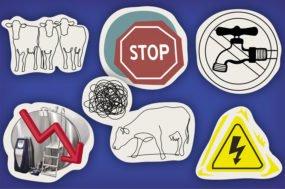I received a lengthy message from a woman who is concerned for her farming daughter who lives far away from her former city life.
She said she would write a book about “moving into someone’s past. How many young women understand the concept of moving into someone else’s past?”
I live in my husband’s childhood home that was built in 1960 when his parents put up two quarters of land to secure the house build for $12,000. In 2020, we thought we were moving to town, but plans changed when our son decided to buy a new home just across the shelterbelt.
Housing is a great example of navigating the stories, emotions and memories attached to the main farmyard. We did not own our home for the first 11 years of our marriage, and when we finally got title, the renovations began.
“Many women who move to remote farms in their husband’s family lose many of the options their urban friends still have,” read the message. Yes, and I would add, comparison of your life to others, especially on social media is a joy stealer. When you are planted in a remote rural area, or far away from city friends, you must be very intentional about creating a life that aligns with your values and goals. Hopefully you had some fruitful direct conversations about these core beliefs with your spouse or partner before you agreed to move onto the farm.
So what can be done to navigate lonely, epic life changes?
For me, it was finding a robust church community of people who walk alongside us in the good times and the bad times. It is also part of my routine to pick up my phone and reach out to college friends who live across Canada. They sometimes visit the farm, but regardless I stay connected to people who can fill my emotional bank account, marvel at the adventures of farm life and ask if I need prayer.
Here is some more constructive advice for young women with lonely hearts.
1. Know what fills your emotional bank account
Relationships are one of my top seven values. I work on connecting, and even when the relationship feels a bit one-sided, I get to choose if I want to continue to reach out. What does self-care mean to you?
2. Find mentors close to the farm
For me, it was Frances McCausland Stobbe Sawatsky, a nurse who farmed, had married into the Mennonite culture and was an Englander, just like me. She is now 95, lives 20 miles away, and we still have phone visits. She became like an adopted mom to me very early on in our marriage, as my mom was over three hours away.
3. Cherish your marriage
Marriage courses, virtual counseling, podcasts about relationship design and retreats for farm couples are some of the resources available to strengthen your marriage.
4. Journal
Write out your thoughts in your private journal to process what is happening in your life. Take time to reflect and write reasons to be grateful. Avoid hanging out in social media groups for farm wives that have a lot of ranting about spouses with little to no solutions offered. As Brene Brown would say, “What is the story you are telling yourself?” Are you feeling trapped, misunderstood, taken for granted? What is your role in change? What questions are you asking others? What choices do you have to create a more intentional, fuller life?
5. Consider therapy or coaching
If you are in trauma or suffering a mental illness episode, you need to reach out for professional help and treatment. The National Farmer Mental Health Alliance has developed an ag-informed therapy course to help therapists understand the realities of farm life. Asking for help is not a sign of weakness; it is a strategy of wisdom. People will not know how you are struggling with your new life in a remote rural area if you keep silent. Depression can rise from hard circumstances, so don’t suffer alone – reach out.
6. Be patient and manage your expectations
Your spouse and their family cannot meet all of your needs. What can you do to “fill your well"? Understand it takes time and intention to build a sense of connection and community. When we were raising young children, a group of us young moms made a point to meet at the lake together for play times. I also had a friend who left her son with me on Tuesdays, and I left my son with her on Thursdays. These blocks of bartered time gave us “adult time” to renew and refresh the many roles we manage daily on the farm.
7. Farm families are comfy with their history
You are the new kid on the block, so to speak, and are joining an existing dynamic which may be a lot different than your family of origin. There are many “unwritten rules” in ag families you can unpack with powerful questions. Ask “I am just curious, why is it so important to you to ___________?” Fill in the blanks. Come from curiosity, not judgment. Different is not wrong; it is just different.
8. Contribute to your community
Volunteer at the rink or your church. Share your gifts in serving others. In the message I received, it read, “You can never go wrong with contributing to your community. It may not be anything huge, but just shine your little light where you can, and by contributing, you’ll make new connections and feel great at the end of the day!”









